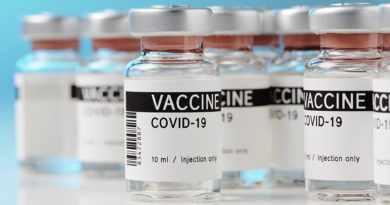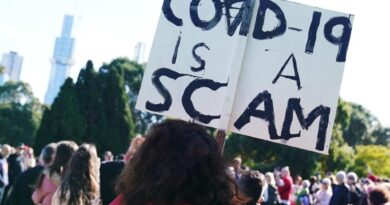The BMJ interview: Fixing America’s covid response in the Biden era | The
- Joanne Silberner
- The BMJ
- jsilberner{at}bmj.com
Celine Gounder is an infectious diseases expert and epidemiologist who has worked on Ebola, tuberculosis (TB), and HIV in Africa and South America. She’s a clinical assistant professor of medicine and infectious diseases at New York University’s School of Medicine, as well as an active writer and podcast host, including of Epidemic, a show about the coronavirus pandemic.1
In November, US president elect Joe Biden named her as one of 13 members of his covid-19 advisory board, joining other physicians, ethicists, and public health experts.
The interview has been edited for length and clarity.
How did a busy practising physician get named to the advisory board?
I’ve worked in both global and domestic public health for many years on diseases that have much in common with coronavirus—like another airborne infection, TB. You do contact tracing, screening, and testing for people in very similar ways, whether it’s Ebola, HIV, or TB. They’re all diseases that tend to affect people who are poor, more marginalised, and have worse access to care. I also have experience managing public health programmes on the communications journalism front.
I was on service at Bellevue Hospital caring for patients and I got a text from somebody on the Biden-Harris team and was told that this might happen. I was very excited to get the news, it’s really quite an honour and a privilege.
The international community, as well as many Americans, think the US response to covid-19 has been appalling. What happened?
Unfortunately, the response has been politicised. We’ve seen this in other contexts as well. I think back to Ebola in West Africa.
I was an aid worker for two months in Guinea when it, as well as some other countries in the region, was facing its own presidential elections during an epidemic. The political messages and the public health messages got conflated. You had people of the Guinean president’s party wearing the yellow t shirts of the president, with his face on them, going door to door and educating about Ebola.
In the US you have a lot of people who are disillusioned and distrustful of government in general. Distrust can lead to conspiracy theories. You could argue that there is a president who is not listening to scientists. It was not in his political interests, at least in his mind, to listen to scientists or to follow the science.
And, unfortunately, that has led to a poor response here in the US, a very patchy response, with some states following the science more than others.
What are the priorities come 20 January, when Joe Biden is inaugurated as the new president?
One of the initial executive orders will be the invoking of the Defence Production Act to ramp up production of personal protective equipment. When I go to the hospital, there’s like a bank teller window that you go up to and show your ID and get dispensed your N95 masks for the week. We have been in this rationing mode for months now and that’s not going to change without leadership.
And then, in addition to that, you’re going to see very strong messaging around masks. The president elect has said that he’s going to ask Americans to commit to wearing masks for the first hundred days he’s in office. They’re cheap. They’re effective. They do not close the economy. And until we are able to get everyone vaccinated—which is going to take months, realistically—until then, our best tool is a mask. And, unfortunately, masks have been politicised.
Will the advisory board be calling for a mask requirement?
The federal government does not have jurisdiction to mandate mask wearing in most settings. Mask mandates would be the decision of mayors and governors. What we’re talking about is very strong messaging and encouragement of mask wearing.
One thing that has been encouraging is that Americans are getting better at this. They are wearing them more frequently than they were early on. Now about 90% of Americans wear masks some of the time at least.
They may not be perfect about how they wear them, but that’s a huge improvement over what we were seeing earlier. The more we make it a social norm and leverage peer pressure, as opposed to government pressure, that is what is going to be more effective.
You’ve got a special interest in matters of racial and social disparities—how will that inform your advisory activities?
Covid-19 is a disease of people who tend to be poor and marginalised. My patients over time have been largely people of colour or people of LGBT+ orientation. And a large proportion of my patients have struggled with substance use disorders or mental health disorders. Those are all groups that struggle to trust the system—whether it’s the government or the healthcare system—and where there are going to be problems of trust as we move forward with vaccination. How you reach out to those communities, hear those concerns, understand those concerns, and work with them to bridge that gap is going to be really important.
What kind of advice can the advisory board give to tackle those concerns?
As medical volunteers in West Africa during Ebola we partnered with a host of social scientists, anthropologists, sociologists, and psychologists who went out into the field and met with people on the ground. Because what you need to understand, first of all, is where people are coming from. What is being said in these communities? What are the rumours, the conspiracy theories, the concerns?
You also start to identify the community leaders. If you show that you care, if you show that you’re listening—that process also starts to create a bridge where you have people who are leaders who start to trust you, who are willing to work with you. They are the ones that then talk to others in their community. In the case of Ebola, the matters were around hygiene measures and safe burials. With covid-19, it’s going to be about masks and getting tested and vaccinated.
Let’s say you’re a primary care doctor and you see that the hospitals are crowded and the numbers are shooting upwards. What do you do?
It depends on what’s needed in your particular context and what your skill sets are. It could be something like writing an opinion article. It could be writing to your mayor. Those are some great starting points. Bearing witness in written form—or reaching out to your local radio station or your local TV station—can have tremendous impact.
The impact that you have in a five minute clip, if you’re somebody who people know in the community who’s respected, who maybe is a family doctor for a lot of the people in that town, that will resonate in a completely different way.
In addition to being a physician, you’re a writer and a journalist. What are your views on communications to the public about covid-19, and will the board be dealing with that?
Many of us are doing interviews at the moment, it’s really important as we move forward. And it’s important for those interviews to be grounded in science. Unfortunately, science has been under attack and, more recently, public health has also been under attack. We need to try to restore trust in those.
The public’s burnt out with this pandemic. What can the advisory board, and you as a member, do to get the public more excited about doing the things that they need to do?
People listen to people who look like themselves, who are from their own communities, and so it’s really important to be recruiting those kinds of voices, to be telling their stories, to be sharing their stories, and for those voices to be the leading voices on these matters. And it takes time and effort to develop that.
What I’m talking about is developing almost a legion of people who are embedded in communities. It’s not just about putting them on television to speak. A lot of it is word of mouth, social media, those kinds of things that are more organic. It requires a lot of conversation and a lot of listening, and a certain openness and curiosity about other people to be able to do that.
What are the biggest challenges for the board?
Some of our biggest challenges in the coming months are going to be about healing political divides and promoting public health recommendations. And, unfortunately, so much of the conversation has been public health versus economic concerns. This is something that the president elect and vice president elect are very attuned to. What Congress is passing is, in the president elect’s words, a “down payment.” But it’s not enough. We need to do a lot more, and soon. People are suffering now. They’re running out of money for rent. They’re not able to put food on the table. We’re seeing the longest lines at food pantries that we’ve ever seen.
And so that that needs to be tackled. And if you don’t tackle those problems, it’s going to be more challenging to communicate to people because you’re not tackling their most immediate fears and concerns. Those things have to go hand in hand.
*** This article has been archived for your research. The original version from The BMJ can be found here ***


